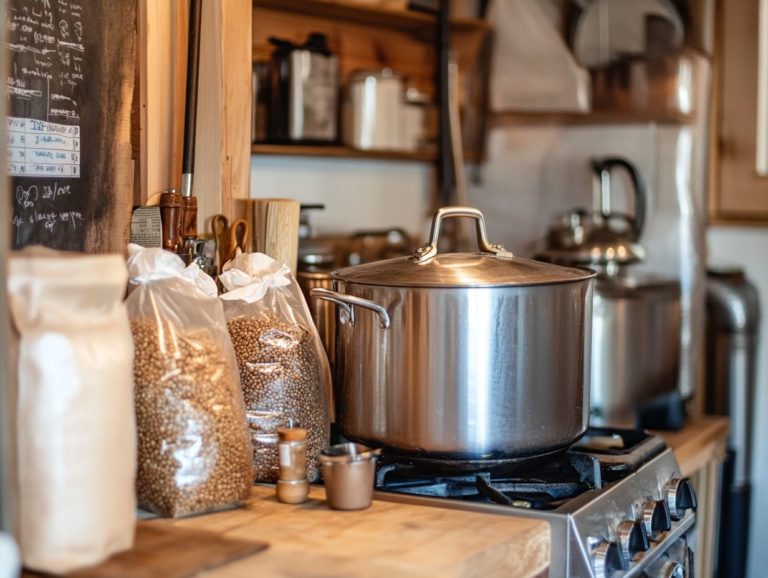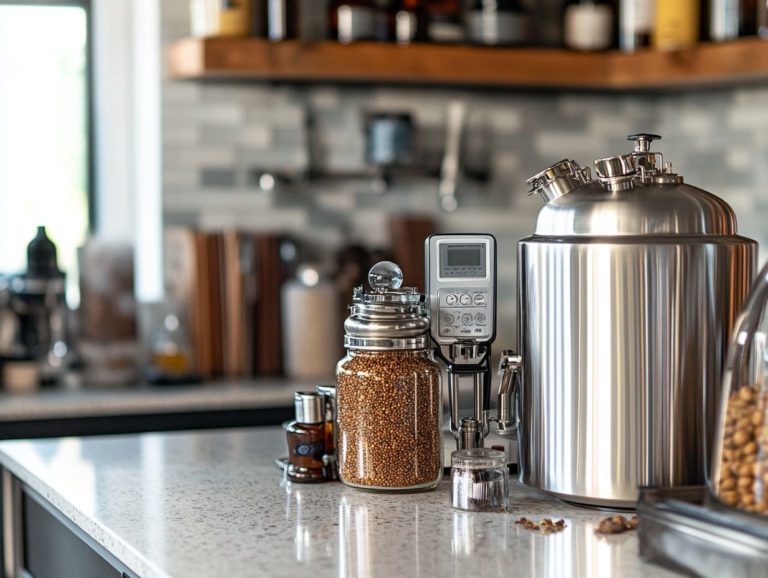What Are the Basic Ingredients for Brewing?
Brewing is a timeless craft that artfully combines a delightful array of ingredients such as barley, wheat, and rye to create the beverages you love.
Whether you enjoy beer, coffee, tea, or kombucha, grasping the fundamental components of each brewing process can elevate both your appreciation and skill in this art. This discussion delves into the essential ingredients for brewing a variety of drinks, from the malt and hops in beer to the tea leaves and SCOBY (Symbiotic Culture Of Bacteria and Yeast) in kombucha, including various brewing methods and techniques.
Embark on this journey with us as we unveil the basics that make each sip a truly special experience!
Contents
Key Takeaways:
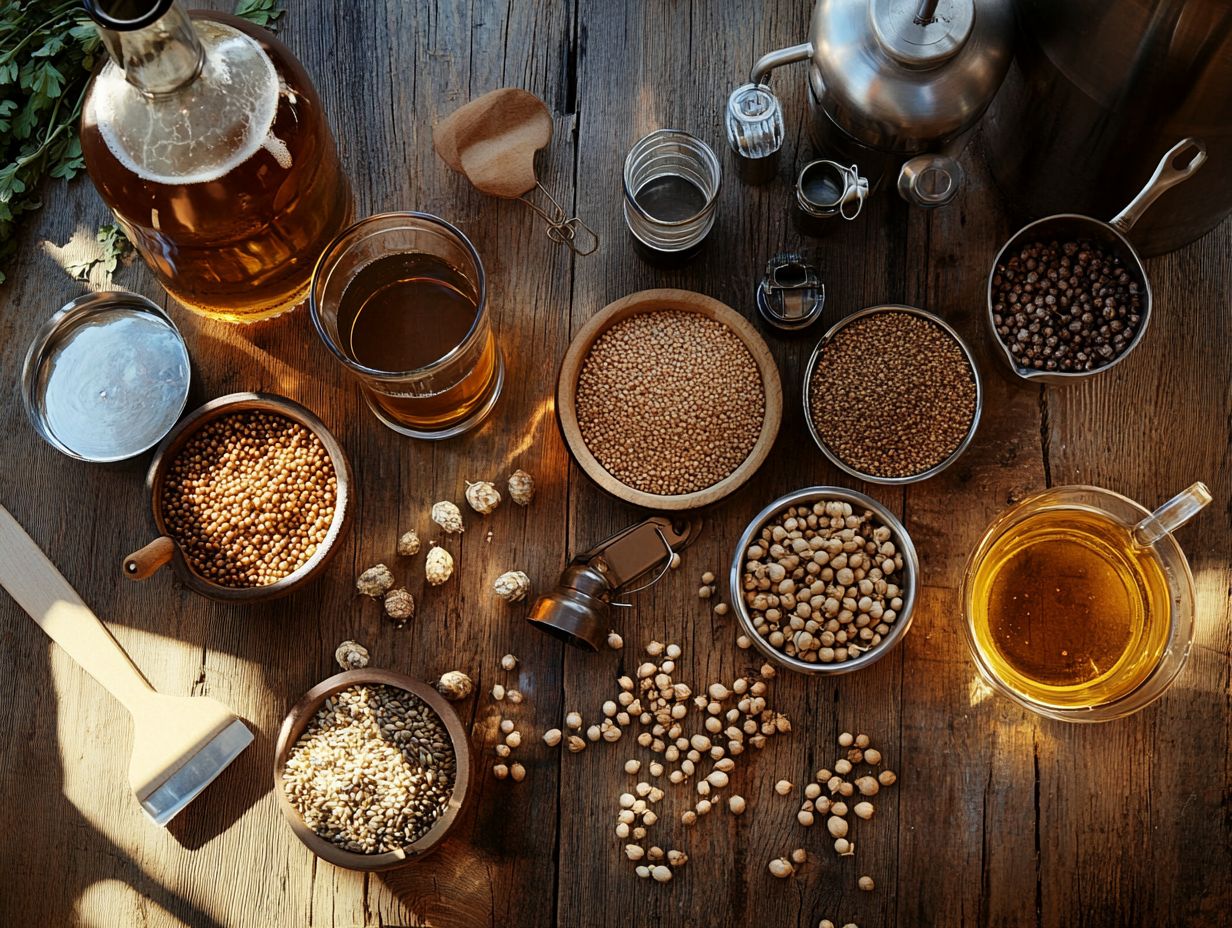
- 1. The basic ingredients for brewing include malt, hops, yeast, and water.
- 2. Coffee brewing requires coffee beans and water, with optional ingredients such as milk or sweeteners.
- 3. Tea brewing requires tea leaves and water, with optional ingredients like honey or lemon.
What Are the Basic Ingredients for Brewing?
Brewing beer is truly an art form and a meticulous process that hinges on several fundamental ingredients. Each ingredient adds its unique touch to the final creation’s flavor, aroma, and overall complexity. Discover the four primary components that will elevate your brewing experience: malt, hops, yeast, and water. Each plays a vital role in the transformative brewing process.
Malt, sourced from grains like barley, wheat, and rye, provides the sugars crucial for fermentation. Hops impart bitterness and aroma, expertly balancing the sweetness of the malt. Yeast is the unsung hero, converting those sugars into alcohol and carbonation. Meanwhile, water serves as the backbone for both brewing and fermentation.
Embrace these elements, and you ll be well on your way to crafting a remarkable brew by adhering to traditional brewing techniques and methods.
1. Malt
Malt is the cornerstone of beer brewing. It provides the essential sugars that yeast ferments into alcohol, and its quality plays a crucial role in shaping the beer’s flavor and aroma.
Different types of malt, like pale, caramel, and roasted varieties, contribute uniquely to the final product’s color, taste, and sweetness. Pale malt serves as the foundation, offering a light color and delicate flavor. Caramel malt brings in warm amber tones and a hint of sweetness, creating a beautifully balanced profile. In contrast, roasted malts add depth with their rich, bold flavors, often featuring delightful chocolate or coffee notes.
The malting process begins with soaking grains to encourage germination. After that, the grains are dried to halt the sprouting, which enhances the enzyme activity necessary for converting starches into sugars. The quality of malt, whether it includes barley, wheat, or rye, not only influences the resulting flavors but also defines the overall character and complexity of the beer.
2. Hops
Hops are an essential ingredient in beer, providing both bitterness and aroma that beautifully balance the sweetness from the malt.
With a diverse array of hop varieties at your disposal, such as Cascade, Citra, and Saaz, each brings a unique flavor profile that can significantly transform the character of your brew. For instance, Cascade hops offer delightful floral and citrus notes. On the other hand, Saaz hops are revered for their earthy and spicy qualities. These hops can be selected from an online store catering to specific brewing needs.
Timing is everything when adding hops during the brewing process. Early additions primarily amplify bitterness. In contrast, late-stage additions and dry-hopping techniques maximize aroma. The harvesting season of hops is crucial; the freshness and quality of the hops you choose can dramatically influence the final taste and aroma profile of your beer.
3. Yeast
Yeast is the unsung hero of fermentation in the brewing process, transforming the sugars from malt into alcohol and carbon dioxide.
Different strains of yeast, such as Saccharomyces cerevisiae and Saccharomyces pastorianus, play a pivotal role in determining a beer’s style and taste. Saccharomyces cerevisiae, commonly referred to as ale yeast, thrives in warmer temperatures, enhancing fruity and complex flavors making it the perfect choice for bold styles like IPAs and stouts.
Additionally, these yeast strains contribute significantly to the production of esters and phenols, which add depth and complexity to the beer’s aroma and flavor.
On the other hand, Saccharomyces pastorianus, or lager yeast, prefers cooler environments, delivering a clean and crisp taste that is essential for lagers and pilsners.
The fermentation conditions, encompassing temperature and duration, significantly impact the aroma, flavor profile, and overall quality of the beer. This flexibility allows brewers to craft a remarkable array of delightful beverages, each with its unique charm.
4. Water
Water is often overlooked, yet it s an essential ingredient in beer brewing, making up most of the final product and significantly influencing the entire brewing process.
The brewing salts and minerals present in water can greatly affect every part of a beer, from its flavor profile to its texture. Consider how factors like calcium, magnesium, sulfate, and chloride levels can either amplify or soften flavors, shaping your experience with each delightful sip.
For example, a higher sulfate concentration can deliver that crisp, dry finish you often find appealing in IPAs, while a well-balanced chloride level enhances the fullness and roundness characteristic of stouts and porters.
Regional water profiles, whether soft or hard, play a vital role in defining specific beer styles, enabling brewers to create beverages that truly resonate with their desired flavor profiles. Understanding this relationship, including the acid levels and mineral content, can elevate your appreciation of beer, allowing you to savor the nuances that come from that often-overlooked ingredient.
5. Optional Ingredients
In addition to the staple ingredients, brewers often introduce optional ingredients to craft unique flavors and add depth to their beers. These enhancements can be anything from a delightful mix of fruits like raspberries or oranges, delivering a refreshing zing, to a variety of spices such as coriander or cinnamon, which impart a warm, inviting aroma.
Herbal infusions, like chamomile or basil, can throw in an unexpected twist, completely transforming the beer’s character and elevating your tasting experience. This creativity reflects the spirit of the German Beer Purity Law, ensuring that every brew is made with quality and authenticity.
Not only do these ingredients enrich the overall aroma and flavor, but they also beckon you to embark on a sensory adventure, making every sip a delightful journey of discovery.
This flexibility allows for creative combinations, utilizing grain types like oats, corn, and rice, to produce unique brews. This creativity allows brewers to infuse a personal touch into their creations, enabling them to craft distinctive beverages that truly stand out in a saturated market.
What Are the Basic Ingredients for Brewing Coffee?
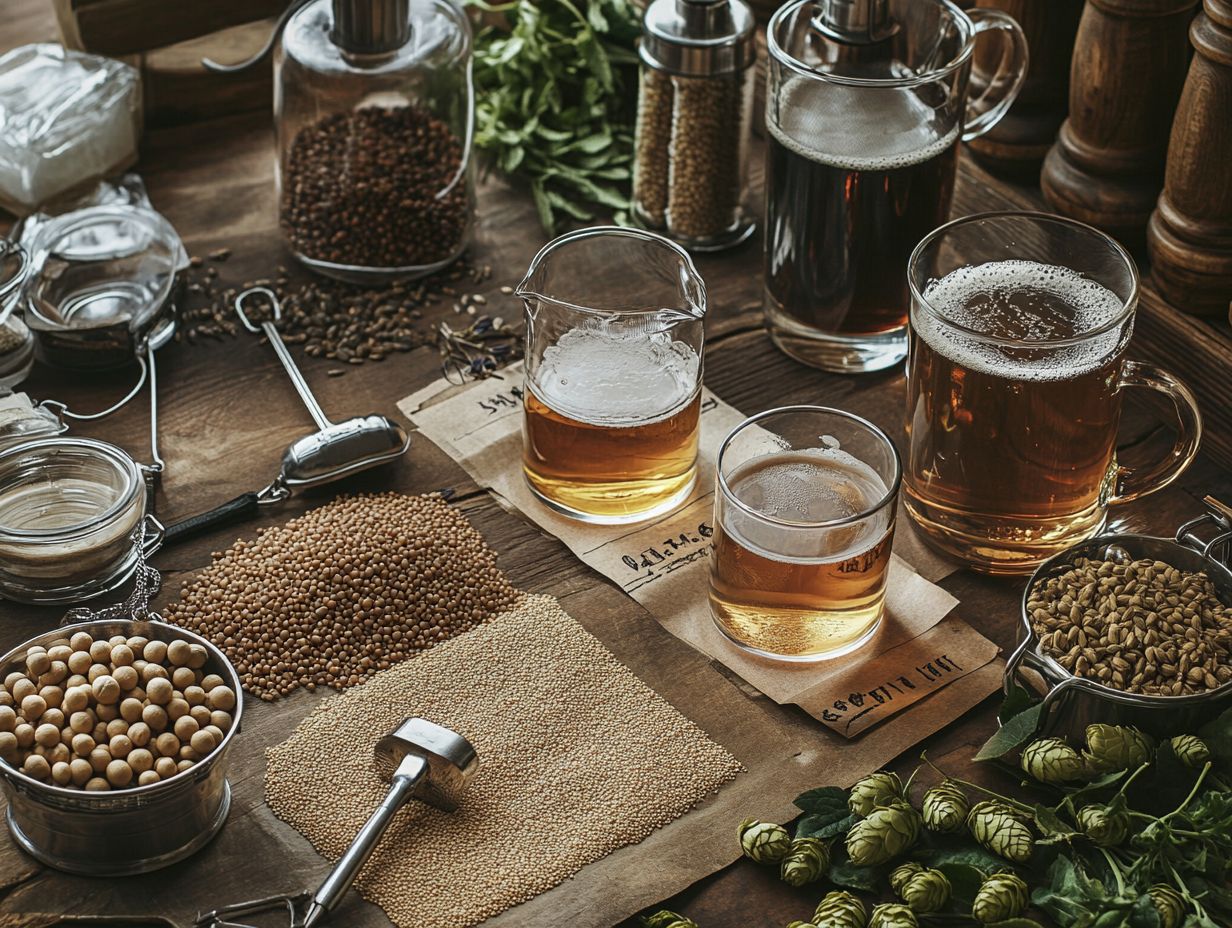
Brewing coffee requires a selection of essential ingredients that are pivotal in crafting a flavorful and aromatic cup, with coffee beans standing out as the most crucial element.
1. Coffee Beans
Coffee beans serve as the cornerstone of your coffee brewing experience, and the variety you choose plays a pivotal role in shaping the final flavor profile, just as different malt types and hop varieties influence beer brewing.
Among the most celebrated types are Arabica and Robusta, each offering its own unique characteristics. Arabica beans, revered for their smooth and nuanced flavors, often present a delightful hint of sweetness and acidity that many coffee connoisseurs adore. In contrast, Robusta beans pack a stronger punch, exhibiting a more bitter taste and higher caffeine content, which appeals to those who appreciate a bolder brew.
The roasting process is another critical factor. Light roasts tend to preserve the bean s original flavor, allowing the fruity or floral notes to shine through. Meanwhile, dark roasts bring forth a richer, more caramelized taste, often laced with a smoky finish. By understanding these nuances, you can truly elevate your appreciation for the intricate world of coffee.
2. Water
Water ranks as the second most crucial ingredient in your coffee brewing journey, making up the bulk of the beverage and directly influencing its overall flavor.
The quality of the water can dramatically impact the coffee s flavor profile, touching on elements like aroma and balance. Temperature is another key player; it s essential for effectively extracting the various soluble compounds from the coffee grounds. Ideally, you want your water heated to a range of 195 F to 205 F to achieve that sweet spot for optimal extraction, steering clear of both under-extraction and unwanted bitterness. Just like in beer brewing, the brewing water’s quality is paramount for achieving the desired flavor and aroma.
The mineral content in your water also matters it shapes the body and richness of your coffee.
If you re using hard water, which boasts a higher mineral concentration, you ll likely enhance the extraction of oils, resulting in a fuller-bodied cup. On the other hand, soft water might leave your brew tasting lighter and lacking in complexity.
By grasping these nuances, you can elevate your coffee brewing skills and craft the perfect cup every time.
3. Optional Ingredients
Optional ingredients have the power to elevate your coffee experience, enhancing its flavor, aroma, and overall enjoyment while allowing for a delightful array of brewing combinations.
By incorporating elements like milk, you can achieve a creamier texture and soften the bitterness, resulting in a smoother sip that appeals to a wide range of tastes. Introducing sugar can add a delightful sweetness that beautifully balances the coffee’s natural acidity, making it more approachable for those who lean toward a milder flavor profile. Adding cream can further enhance the richness and mouthfeel, making it the perfect addition for those who appreciate a decadent beverage.
Flavor syrups from classic vanilla to indulgent caramel can infuse your beverage with unique and intriguing notes, creating a signature drink that perfectly reflects your personal preferences. Consider experimenting with hazelnut or toffee for a delightful twist.
And let s not forget about spices like cinnamon or nutmeg; they can elevate your coffee to new heights, providing warmth and depth that transforms a simple cup into a comforting delight.
What Are the Basic Ingredients for Brewing Tea?
Just like in beer brewing, understanding the basic ingredients for tea can elevate your experience.
Brewing tea is an art that hinges on a few essential ingredients, with tea leaves standing as the cornerstone that defines the beverage’s rich flavor and enticing aroma. Similar to the brewing process for beer, the quality of the ingredients plays a vital role in determining the final product.
Exploring the Essentials of Tea and Kombucha Brewing
1. Tea Leaves
Tea leaves are pivotal to the brewing process, enriching your cup with distinct flavors and aromas that elevate the entire experience. The variety of leaves you use can be as diverse as the different malt types in beer brewing.
Each type of tea leaves whether black, green, oolong, or white boasts its own unique flavor profile, ranging from bold and robust to delicate and floral. For instance, when you indulge in black tea, you ll savor a full-bodied flavor with delightful hints of malt and sweetness. In contrast, green tea presents a fresh, vegetal taste that might even remind you of a gentle grassy breeze.
The nuances of brewing time play a crucial role in unlocking these exquisite flavors. Black tea flourishes when steeped in boiling water for three to five minutes. Green tea requires a more delicate approach, favoring cooler water and a brief infusion of one to three minutes to achieve optimal flavor without veering into bitterness.
By understanding these variables, you can craft the perfect cup that beautifully showcases the distinct characteristics of each tea leaf.
2. Water
Water is a vital component in your tea brewing journey, playing a key role in extracting the rich flavors from the tea leaves.
The quality of your water is crucial and can drastically influence the overall taste and aroma of your brew. For example, using hard water might introduce unwanted mineral flavors, while water with excessive chlorine can overshadow the delicate nuances of your tea.
Temperature also holds great importance; different types of tea demand specific brewing temperatures to unveil their unique characteristics. Green teas, for instance, flourish in cooler water, whereas black teas truly shine with hotter temperatures.
By understanding the intricate relationship between water profiles and the tea experience, you can fully immerse yourself in the complexities of your favorite brews.
3. Optional Ingredients
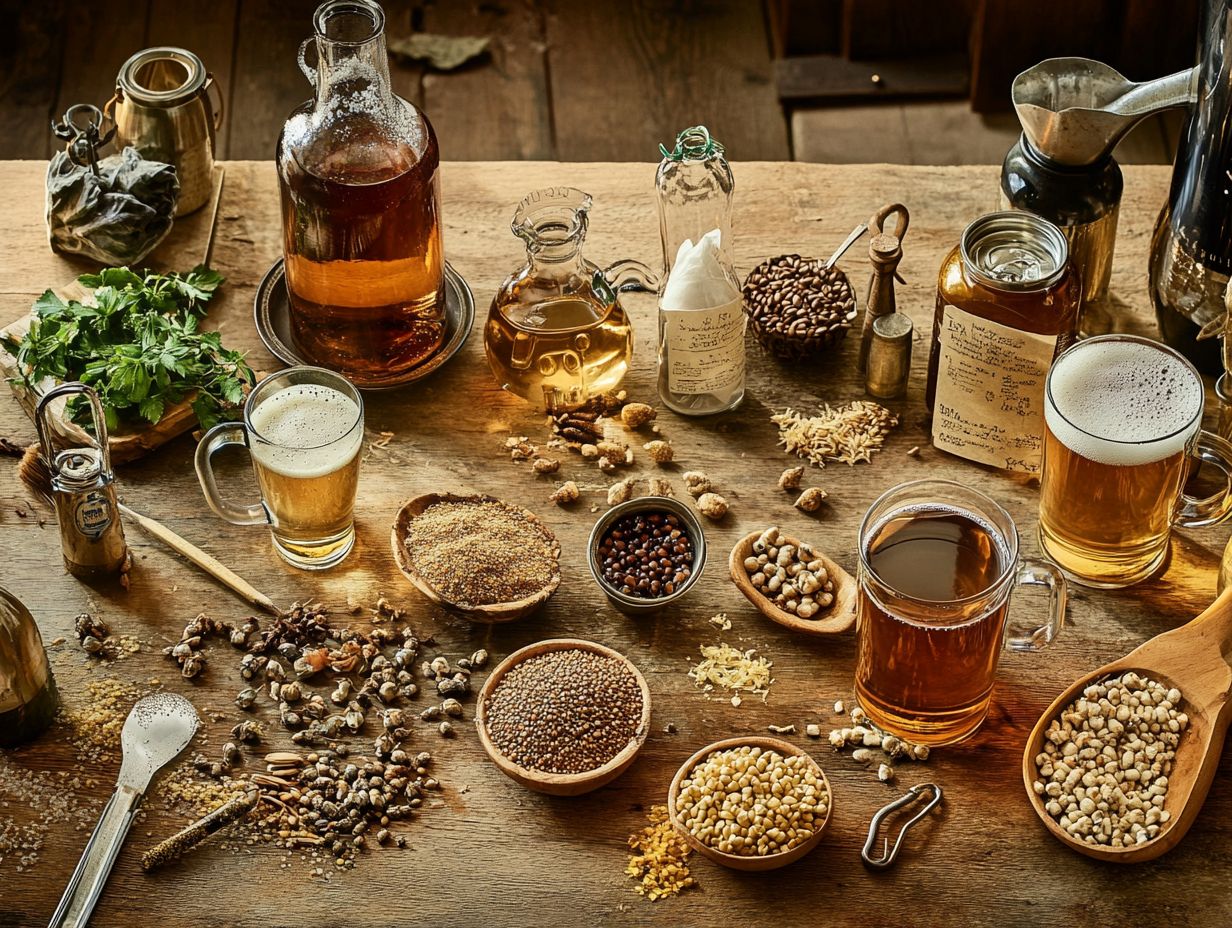
Optional ingredients can be added to your tea, allowing you to craft unique flavor profiles and elevate your drinking experience.
By incorporating additions such as lemon, honey, or various spices, you can customize your brew to perfectly align with your taste preferences. Just a splash of lemon introduces a refreshing tang and a vibrant aroma that can lift your spirits. A drizzle of honey, on the other hand, gives natural sweetness, softening the tea s bitterness and adding a velvety texture that caresses the palate.
Incorporating spices like cinnamon or ginger not only brings warmth and complexity but also turns a regular cup into a comforting drink. These thoughtful modifications enhance the flavor, making each tea-drinking occasion feel distinctly special and tailored just for you.
What Are the Basic Ingredients for Brewing Kombucha?
Brewing kombucha is an exciting adventure that transforms simple ingredients into a deliciously fizzy drink!
Much like beer brewing, kombucha brewing involves a fascinating fermentation journey. Brewing kombucha requires a specific ensemble of ingredients, including:
- Tea
- Sugar
- SCOBY (a culture of bacteria and yeast that helps ferment the tea)
1. Tea
Tea serves as the cornerstone ingredient in kombucha, giving it flavor and essential nutrients that are vital for the fermentation process. Just as different hop varieties can influence the taste of beer, the type of tea you choose can greatly impact the flavor of your kombucha.
The choice of tea can dramatically shape the final outcome of your beverage, presenting a diverse array of taste profiles that cater to your individual preferences. Common selections include black, green, and white tea, each contributing its own distinctive character. For example, black tea offers a robust, malty flavor, while green tea typically provides a lighter, more delicate nuance. You can even experiment with herbal teas, which introduce a vibrant spectrum of flavors, from soothing chamomile to tart hibiscus.
Ultimately, your choice of tea not only dictates the taste but also influences the nutritional benefits of your kombucha. Different teas bring varying levels of antioxidants compounds that help protect your cells from damage and other beneficial compounds, enriching your brew in both flavor and wellness.
2. Sugar
Sugar plays an important role in brewing kombucha, serving as the essential fuel for the yeast and bacteria residing in the SCOBY. This fermentation journey transforms sugar into alcohol and an array of organic acids, crafting the unique tangy flavor profile that kombucha aficionados adore.
The delicate balance between sugar content and fermentation duration directly impacts the final product’s tartness and sweetness. As the yeast consumes the sugars, it generates carbon dioxide, lending that delightful effervescence that so many enthusiasts cherish.
Ultimately, the amount of sugar you choose to use during the brewing process not only nourishes the SCOBY but also shapes the entire taste experience, making it a crucial element of kombucha’s overall character.
3. SCOBY (Symbiotic Culture of Bacteria and Yeast)
SCOBY, which stands for Symbiotic Culture of Bacteria and Yeast, is essential for fermenting kombucha, transforming sweetened tea into that fizzy, tangy beverage you adore.
This culture plays a critical role in the fermentation process by devouring the sugars present in the tea and producing delightful byproducts, including organic acids, carbon dioxide, and even trace amounts of alcohol. It s fascinating to consider how the SCOBY not only crafts the distinctive flavor but also guarantees the effervescence that kombucha enthusiasts cherish.
To ensure successful brewing, maintaining the health of this culture is paramount. You’ll need to carefully monitor the environment, ensuring optimal levels of temperature and nutrients to keep those microorganisms thriving.
Without a healthy SCOBY, the fermentation process can spiral out of balance, resulting in off-flavors and the potential for harmful bacteria. So pay attention to your SCOBY it s the heart of your kombucha brewing journey.
4. Water
Water serves as the foundational ingredient in kombucha, playing a vital role in dissolving sugar and brewing the tea that forms the drink’s base. The quality of water used is as crucial here as it is in the beer brewing process.
The quality and temperature of the water you choose are crucial factors that can greatly influence the fermentation process. Each water profile offers unique minerals and pH levels, which can either enhance or inhibit the growth of the symbiotic culture of bacteria and yeast (SCOBY). For example, hard water with higher mineral content may contribute to a more robust flavor profile, while soft water tends to yield a milder taste.
The temperature of the water affects the fermentation rate. Warmer water can accelerate the process, but it needs careful monitoring to avoid undesirable tastes.
Thus, understanding how these variables interact is essential for you as a brewer striving to create the perfect kombucha.
5. Get Creative with Your Flavorings!
Optional flavorings can elevate your kombucha after fermentation, allowing you to create an array of exciting flavor profiles. These additions not only enhance the drink’s taste but also infuse a touch of creativity into your brewing process.
- Add fruits like berries, citrus, or tropical varieties to introduce refreshing sweetness and vibrant colors to your concoction.
- Incorporate herbs such as mint, basil, or rosemary for a unique aromatic quality.
- Use spices like ginger or cinnamon to contribute warmth and depth to the flavor.
Experimenting with these flavorings opens the door to kombucha that caters to a variety of palates and preferences, transforming a simple fermented tea into a signature beverage that delights the senses and inspires culinary exploration.
Frequently Asked Questions
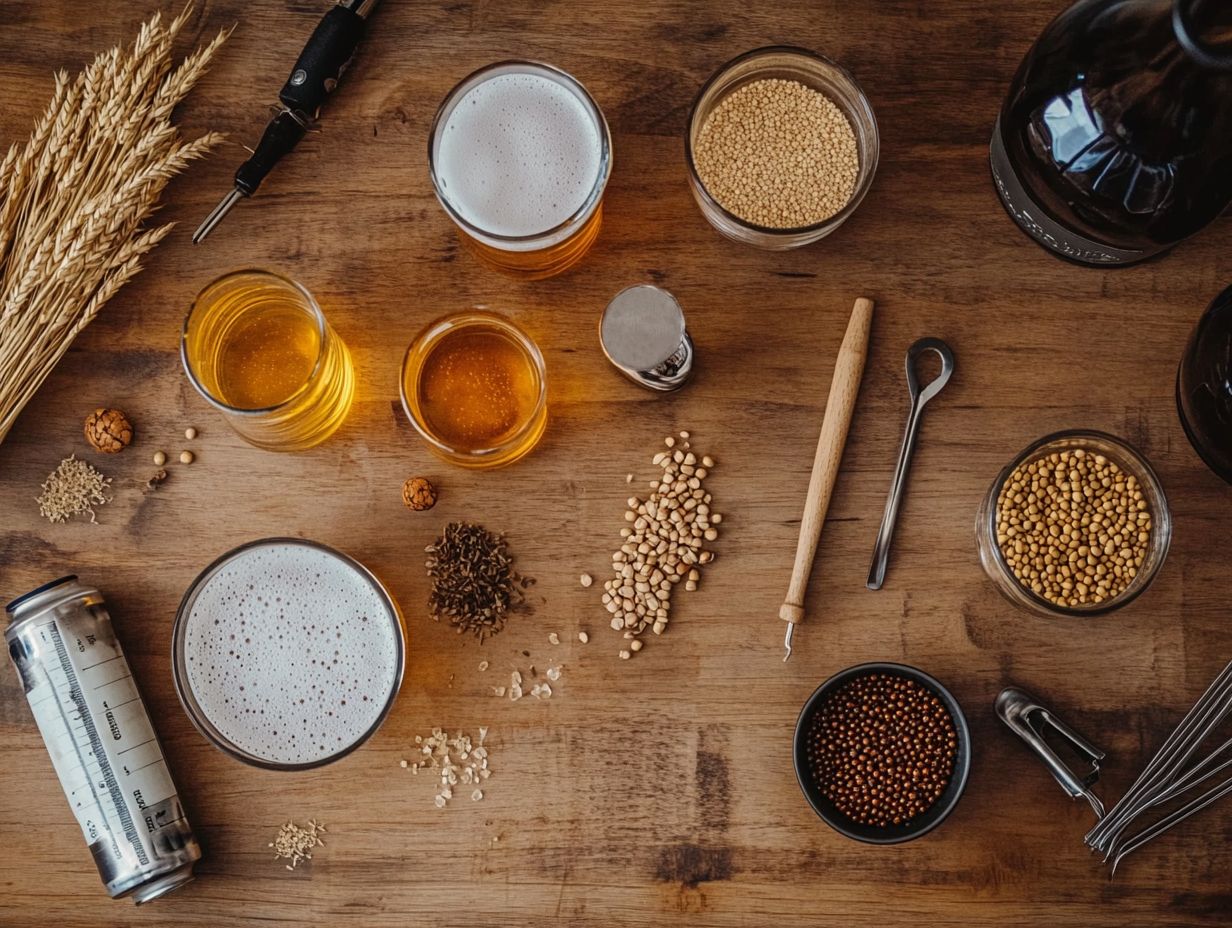
Let’s delve into some of the most frequently asked questions about brewing, covering everything from beer to kombucha.
What Are the Basic Ingredients for Brewing?
The basic ingredients for brewing are water, malt, hops, and yeast. These are essential whether you are brewing beer or kombucha.
What is the role of water in brewing?
Water is the primary ingredient in brewing and makes up about 90% of beer. It provides the liquid base for the other ingredients and affects the overall flavor and character of the beer. The same holds true in kombucha brewing, where water quality is equally important.
What is malt and why is it important in brewing?
Malt is crucial in brewing, serving as the primary source of fermentable sugars. This ingredient is responsible for the beer’s color, flavor, and body. Different types of barley, wheat, rye, oats, corn, and rice can be used to create a variety of malt profiles. The malting process involves germinating and drying these grains, which produces enzymes that convert starches into fermentable sugars.
What role do hops play in brewing?
Hops, including various hop varieties, are flowers added to beer during the brewing process to impart bitterness, aroma, and flavor. They balance out the sweetness of the malt and add complexity to the beer’s taste.
The timing of hop harvesting can significantly impact the final flavor profiles of the beer.
What is the importance of yeast in brewing?
Yeast, such as Saccharomyces cerevisiae and Saccharomyces pastorianus, are microorganisms that convert the sugars from the malt into alcohol and carbon dioxide. Different yeast strains can add unique flavors to the beer and affect the aroma and mouthfeel.
Yeast also produces compounds called esters and phenols, which enhance the beer’s complexity.
Are there any other ingredients that can be added to brewing?
Yes, there are many other ingredients that can be added to brewing to create different types and flavors of beer. Discover how adding fruits, spices, and herbs can transform your beer!
Brewers often use grain types such as wheat, rye, oats, corn, and rice to develop unique brewing techniques and creative combinations. The brewing process might also involve specific brewing salts to adjust acid levels and achieve desired beer consistency.
Adhering to the German Beer Purity Law, or Reinheitsgebot, can also influence the selection of ingredients. Don t miss out! Explore our online store now to find essential brewing accessories that will elevate your next brew day!

